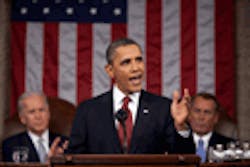Obama light on specifics for trucking
To read the complete text of the State of the Union address, click here.
In a rousing State of the Union address replete with numerous rhetorical flourishes pitched at the Washington establishment and above all to voters nationwide in this thus far tumultuous election year, President Obama detailed his Administration’s accomplishments to date, but gave few specifics on elements of his “blueprint for an economy that's built to last – an economy built on American manufacturing, American energy, skills for American workers, and a renewal of American values”—that would most directly benefit trucking.
Stating that his blueprint begins with American manufacturing, Obama pointed to how federal financial assistance resulted in the recovery of the American auto industry, noting that GM is again the world’s number-one car maker, that Chrysler has grown faster in the U.S. than any major car company, and that. Ford is investing billions in U.S. plants and factories.
The President made the argument that “what's happening in Detroit can happen in other industries” and told business leaders that they should “Ask yourselves what you can do to bring jobs back to your country, and your country will do everything we can to help you succeed.”
He said that help should begin with reforming commercial taxation. “Right now, companies get tax breaks for moving jobs and profits overseas,” Obama stated. “Meanwhile, companiesthat choose to stay in America get hit with one of the highest tax rates in the world. It makes no sense, and everyone knows it.
“Second,” he continued, “no American company should be able to avoid paying its fairshare of taxes by moving jobs and profits overseas. From now on, every multinational company should have to pay a basic minimum tax. And every penny should go towards lowering taxes for companies that choose to stay here and hire here.
“Third, if you're an American manufacturer, you should get a bigger tax cut. If you're a high-tech manufacturer, we should double the tax deduction you get for making products here. And if you want to relocate in a community that was hit hard when a factory left town, you should get help financing a new plant, equipment, or training for new workers.”
Turning to energy and its impact on the cost of living and national secruity, the President made a case both for increasing the domestic production of carbon-based fuels and for investing in various forms of “clean energy” development and production.
While pointing out that American oil production is the highest that it's been in eight years and that last year the U.S. relied less on foreign oil than in any of the past sixteen years, he argued that with only 2% of the world’s oil reserves, the U.S. “needs an all-out, all-of-the-above strategy that develops every available source of American energy.”
Obama said those sources include natural gas— the supply of which can last the country nearly 100 years. “The development of natural gas will create jobs and power trucks and factories that are cleaner and cheaper, proving that we don't have to choose between our environment and our economy,” he argued. The President added that “it was public research dollars, over the course of thirty years, that helped develop the technologies to extract all this natural gas out of shale rock – reminding us that Government support is critical in helping businesses get new energy ideas off the ground.”
“What's true for natural gas is true for clean energy,” he continued. “In three years, our partnership with the private sector has already positioned America to be the world's leading manufacturer of high-tech batteries. Because of federal investments, renewable energy use has nearly doubled.”
Turning from his vision for a “new energy future,” the President briefly spoke about the need to repair and/or expand various segments of America’s infrastructure: “So much of America needs to be rebuilt. We've got crumbling roads and bridges. A power grid that wastes too much energy. An incomplete high-speed broadband network that prevents a small business owner in rural America from selling her products all over the world.”
As for specifics on how the infrastructure problems should be addressed, the President offered but two. First, he announced he will in the next few weeks sign an Executive Order “clearing away the red tape that slows down too many construction projects.” Second, he admonished Congress they must fund these projects with a war dividend— “Take the money we're no longer spending at war, use half of it to pay down our debt, and use the rest to do some nation-building right here at home,” he asserted.
The President discussed many other issues broadly, from how to address declining home values to adding new safeguards against financial crimes to changing the tax code to right-sizing the military to the renewal of American leadership on the global stage.
